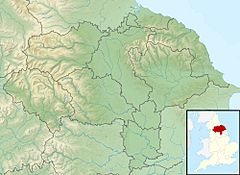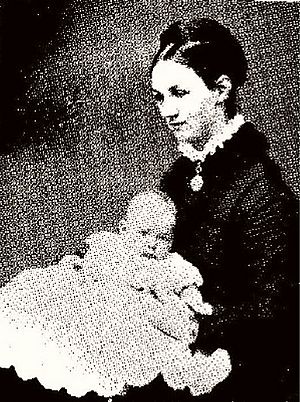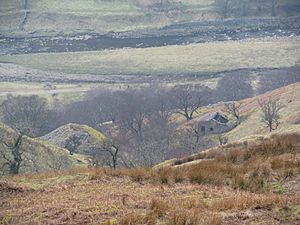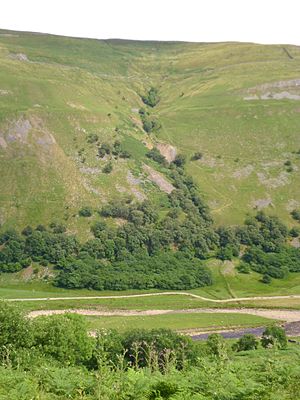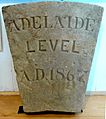Arn Gill (North Yorkshire) facts for kids
Quick facts for kids Arn Gill |
|
|---|---|
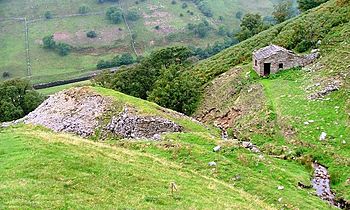
Arn Gill: ravine with former lead mine
|
|
|
North Yorkshire
|
|
| Country | England |
| County | North Yorkshire |
| Physical characteristics | |
| Main source | Arn Gill Head, Swaledale 54°23′20″N 2°07′58″W / 54.38884°N 2.13270°W |
| River mouth | River Swale 54°23′18″N 2°08′27″W / 54.38847°N 2.14071°W |
| Basin features | |
| Landmarks | Former lead mine and spoil heap |
| Waterfalls | There are waterfalls near the outfall to the River Swale |
| Tributary of River Swale | |
Arn Gill is a small valley or ravine in North Yorkshire, England. It has a stream, also called Arn Gill, flowing through it. This stream starts high up on a hill called Arn Gill Head. It then flows steeply downhill and joins the River Swale.
Arn Gill is located near the village of Muker in an area known as Swaledale. The name "Arn" means "eagle," and "Gill" means a valley cut by a river. This area was once famous for lead mining. You can still see parts of an old lead mine called Adelaide Level here.
Contents
The Old Lead Mine at Arn Gill
Lead mining was a big industry in the Arn Gill area for many years. Mines operated here between 1751 and 1921. The Adelaide Level lead mine, whose remains you can still see, was active for a shorter time. It was named after Lady Adelaide Lamont. She was a descendant of a famous judge named Judge Jeffreys.
A Big Discovery
In 1865, something exciting happened at the Adelaide Level mine. A miner named George Cottingham and his son found a very rich vein of galena. Galena is a type of rock that contains lead ore. This discovery was worth about £12,000 at the time. That was a huge amount of money back then!
More lead ore was found in 1918. However, by 1920, it became too expensive to pump water out of the mine. So, the Adelaide Level mine had to close down.
Life as a Miner
Ravines like Arn Gill were helpful for lead mining. Miners could dig horizontal tunnels, called adit levels, right into the side of the valley where the ore was. Some of these tunnels were big enough for a small horse and cart to go inside. These were called horse levels.
In the 1800s, working in lead mines was very tough. Miners often had to walk several miles to and from work each day. The air inside the mines was often very bad. Reports from 1864 showed that in many mines, the air was "extremely bad." This meant there wasn't enough oxygen, and there were harmful gases and dust. Miners often got sick with breathing problems from the dust and bad air.
Despite the dangers, many miners were strong and healthy. Some of them were also small farmers. They had gardens and kept cows, which helped them get fresh milk. This might have helped them stay healthier. Children were not usually employed underground in these mines at a very young age.
What You Can Still See
Today, you can still see parts of the old mine. There's a ruined building that was once the miners' lodging shop. This is where miners might have rested or eaten. You can also see a shallow dip in the ground and a pile of stones. This was likely an old kiln or hearth used for processing wood or ore.
In recent years, a group called the Yorkshire Mine and Cave Group helped clear and rebuild the entrance to the Adelaide Level. The special stone above the entrance, called a keystone, is a copy. The original keystone, which has the mine's name and date, is now kept safe at the Swaledale Museum. The museum has a lot of information about lead mining in the area.
Exploring Arn Gill
Arn Gill is a popular spot for hill walking in Swaledale. There are different walking routes that pass through the area. While you can explore the outside of the mine, it's not safe to go inside the Adelaide Level. However, you can see photos of the mine's interior at the Swaledale Museum.
Images for kids
 | Misty Copeland |
 | Raven Wilkinson |
 | Debra Austin |
 | Aesha Ash |


